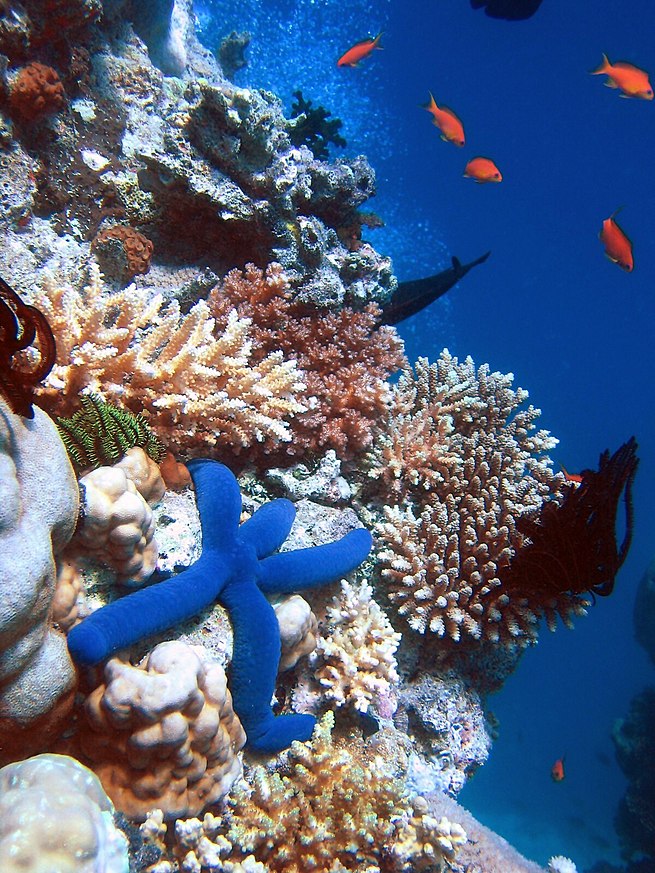
Main Difference
The main difference between Ecosystem and Ecology is that the Ecosystem is a community of living organisms together with the nonliving components of their environment, interacting as a system and Ecology is a scientific study of the relationships between living organisms
-
Ecosystem
An ecosystem is a community of living organisms in conjunction with the nonliving components of their environment, interacting as a system. These biotic and abiotic components are linked together through nutrient cycles and energy flows. Energy enters the system through photosynthesis and is incorporated into plant tissue. By feeding on plants and on one-another, animals play an important role in the movement of matter and energy through the system. They also influence the quantity of plant and microbial biomass present. By breaking down dead organic matter, decomposers release carbon back to the atmosphere and facilitate nutrient cycling by converting nutrients stored in dead biomass back to a form that can be readily used by plants and other microbes.Ecosystems are controlled by external and internal factors. External factors such as climate, parent material which forms the soil and topography, control the overall structure of an ecosystem but are not themselves influenced by the ecosystem. Unlike external factors, internal factors are controlled, for example, decomposition, root competition, shading, disturbance, succession, and the types of species present.
Ecosystems are dynamic entities—they are subject to periodic disturbances and are in the process of recovering from some past disturbance. Ecosystems in similar environments that are located in different parts of the world can end up doing things very differently simply because they have different pools of species present. Internal factors not only control ecosystem processes but are also controlled by them and are often subject to feedback loops.Resource inputs are generally controlled by external processes like climate and parent material. Resource availability within the ecosystem is controlled by internal factors like decomposition, root competition or shading. Although humans operate within ecosystems, their cumulative effects are large enough to influence external factors like climate.Biodiversity affects ecosystem functioning, as do the processes of disturbance and succession. Ecosystems provide a variety of goods and services upon which people depend.
-
Ecology
Ecology (from Greek: οἶκος, “house”, or “environment”; -λογία, “study of”) is the branch of biology which studies the interactions among organisms and their environment. Objects of study include interactions of organisms that include biotic and abiotic components of their environment. Topics of interest include the biodiversity, distribution, biomass, and populations of organisms, as well as cooperation and competition within and between species. Ecosystems are dynamically interacting systems of organisms, the communities they make up, and the non-living components of their environment. Ecosystem processes, such as primary production, pedogenesis, nutrient cycling, and niche construction, regulate the flux of energy and matter through an environment. These processes are sustained by organisms with specific life history traits. Biodiversity means the varieties of species, genes, and ecosystems, enhances certain ecosystem services.
Ecology is not synonymous with environmentalism, natural history, or environmental science. It overlaps with the closely related sciences of evolutionary biology, genetics, and ethology. An important focus for ecologists is to improve the understanding of how biodiversity affects ecological function. Ecologists seek to explain:
Life processes, interactions, and adaptations
The movement of materials and energy through living communities
The successional development of ecosystems
The abundance and distribution of organisms and biodiversity in the context of the environment.Ecology has practical applications in conservation biology, wetland management, natural resource management (agroecology, agriculture, forestry, agroforestry, fisheries), city planning (urban ecology), community health, economics, basic and applied science, and human social interaction (human ecology). For example, the Circles of Sustainability approach treats ecology as more than the environment ‘out there’. It is not treated as separate from humans. Organisms (including humans) and resources compose ecosystems which, in turn, maintain biophysical feedback mechanisms that moderate processes acting on living (biotic) and non-living (abiotic) components of the planet. Ecosystems sustain life-supporting functions and produce natural capital like biomass production (food, fuel, fiber, and medicine), the regulation of climate, global biogeochemical cycles, water filtration, soil formation, erosion control, flood protection, and many other natural features of scientific, historical, economic, or intrinsic value.
The word “ecology” (“Ökologie”) was coined in 1866 by the German scientist Ernst Haeckel. Ecological thought is derivative of established currents in philosophy, particularly from ethics and politics. Ancient Greek philosophers such as Hippocrates and Aristotle laid the foundations of ecology in their studies on natural history. Modern ecology became a much more rigorous science in the late 19th century. Evolutionary concepts relating to adaptation and natural selection became the cornerstones of modern ecological theory.
-
Ecosystem (noun)
A system formed by an ecological community and its environment that functions as a unit.
-
Ecosystem (noun)
The interconnectedness of organisms (plants, animals, microbes) with each other and their environment.
-
Ecosystem (noun)
A set of interconnected products and services.
-
Ecology (noun)
The branch of biology dealing with the relationships of organisms with their environment and with each other.
